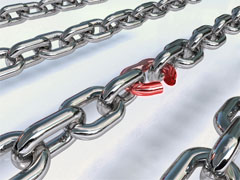From SCDigest's On-Target e-Magazine
April 6 , 2011
Global Supply Chain News: Will Japan Supply Chain Disruptions Really Cause Changes in Approach to Supply Management?
Understanding Risks from Suppliers' Suppliers; Parallel in Japan Disaster and Supply Chain Impact with the 2008 Financial Crisis?
SCDigest Editorial Staff
The earthquake, tsunami and now radioactivity crisis that have hit Japan in the past few weeks are causing severe supply chain disruptions and leading some pundits at least to call for companies to rethink their sourcing strategies.
The Economist magazine made an interesting parallel, finding similarities between the supply chain troubles companies are facing with production in much of Japan severely curtailed and the global financial crisis of 2008.
How's that?
SCDigest Says: |
 |
| But will these lessons really lead to changes in supply chain thinking, or will the short term pain some companies are experiencing from the current Japan disruption quickly be forgotten once things have returned to normal? |
|
What Do You Say?
|
|
|
|
"In both cases, two of the biggest surprises were the unexpected connections the crisisuncovered, and the extent of the contagion," The Economist wrote this week. "The problems began in a seemingly well-contained part of the system—subprime mortgages in the case of finance, in manufacturing’s case a natural disaster in an economic backwater—but quickly spread."
One thing that many observers agree on is that the disruptions from Japan are driving many companies to realize that their supply chain risk profile is not driven only by the direct supplier network, but their suppliers' suppliers and perhaps even the suppliers of their suppliers' suppliers.
Case in point: It turns out that just two Japanese companies, Mitsubishi Gas Chemical and Hitachi Chemical, control about 90% of the market for a specialty resin used to bond parts of microchips that go in to Smart phones and other devices. The factories of both companies were damaged in the quake.
Another: The compact battery in Apple’s iPods relies on a polymer made by Japanese company Kureha, which holds 70% of the market, and whose factory was damaged. While the battery producer is fine, its ability to manufacture is threatened by the troubles at its supplier.
All this, many say, is leading to a rethinking of a global production and logistics systems in which a natural disaster in a small part of Japan's industrial base could have such broad effects around the world
Automotive and electronics manufacturers appear to be the hardest hit. While companies might normally have expected suppliers with modest damage to get back to speed quickly, continued aftershock quakes and now the fear of radioactivity contamination could extend the supply disruptions for some time.
About 13% of worldwide auto output has been lost due to parts shortages, and IHS Automotive has recently estimated it may cut output by as much as 30% within six weeks in a worst-case scenario
Shin-Etsu Chemical Co. is the world's biggest producer of advanced silicon wafers, a key material needed for the producing semiconductors. Its factory in Shirakawa Japan received heavy damage from the quake, and represents about 20% of the globe's capacity to produce key components for several high tech products.
 The disruption could prove to be a big problem for chip makers such as Intel Corp. and Toshiba Corp. that buy wafers from Shin-Etsu, and then in turn OEMs that buy chips from those companies. The disruption could prove to be a big problem for chip makers such as Intel Corp. and Toshiba Corp. that buy wafers from Shin-Etsu, and then in turn OEMs that buy chips from those companies.
Chinese computer maker Lenovo Group recently warn that a shortage of components from Japan could have a impact on output, among others citing the same concerns. Chinese cell phone maker ZTE Corp. said it could face shortages of batteries and LCD screens for months.
The likelihood of more disruptions to come has touched off a scramble for alternative suppliers, and triggered a run-up in the price of memory chips and other parts.
One interesting fact: those companies that had the largest inventory buffers are able to manage through the crisis better than those operating "just-in-time."
(Global Supply Chain Article Continued Below)
|